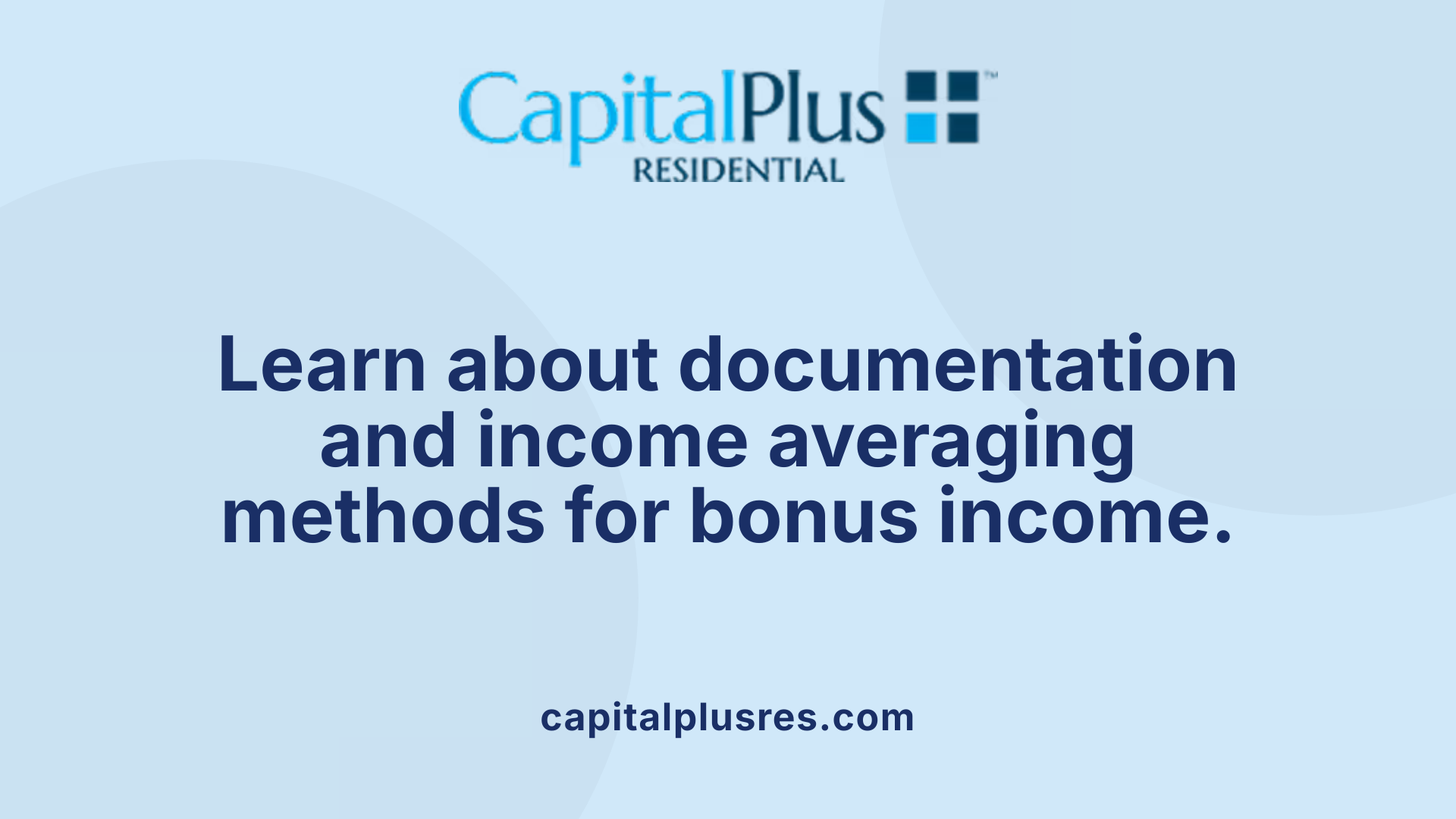Understanding the Role of Bonuses and Commissions in Mortgage Qualification
Mortgage qualification can be complex, especially when applicants receive variable income such as bonuses and commissions. Lenders evaluate these additional sources of income carefully to determine eligibility. This article explores how different types of bonuses and commissions impact the mortgage qualification process and the necessary documentation to support these incomes.
Mortgage Qualification: Bonuses and Commission Income
- Mortgage lenders evaluate guaranteed and discretionary bonuses when qualifying borrowers.
- Guaranteed bonuses require at least 12 months of documented receipt; discretionary bonuses need 24 months of history.
- Lenders average bonus income over 24 months for a realistic estimate, though 12-month averages may suffice for guaranteed bonuses.
- Consistent and structured bonuses paid regularly are more likely to be included in income calculations, strengthening the borrower's profile.
- Verifications such as W-2 forms, pay stubs, VOE letters, and employer notes are necessary to verify bonus income.
- Commission income typically requires a two-year history for qualification, but some lenders accept one year if strong factors are present.
- Loan types impact commission income requirements: Conventional (2 yrs), FHA (1 yr), VA (2 yrs), USDA focus on stability and documentation.
- Documentation for commissions includes tax returns, W-2s, 1099s, pay stubs, and VOE, establishing income stability.
- Commission income is classified as variable income and is averaged over 24 months to reflect accurate earning patterns.
- Lenders prefer a 24-month average for commission income, but 12-month calculations may be used for smaller income portions, emphasizing the importance of proper documentation.
1. Qualifying with Bonuses: Guaranteed vs. Discretionary Income

Types of bonuses considered in mortgage qualification
Mortgage lenders evaluate both guaranteed and discretionary bonuses when qualifying borrowers. Guaranteed bonuses are those promised and consistent, often forming part of a worker's contractual compensation. Discretionary bonuses, on the other hand, are more variable and at the employer's discretion, often linked to performance or company profitability.
Minimum documented income history requirements for bonuses
For guaranteed bonuses to be considered in mortgage qualification, lenders usually require at least 12 months of documented receipt. In contrast, discretionary bonuses demand a longer track record, typically a 24-month documented history, to demonstrate stability and reliability of this income stream.
How lenders average bonus income for calculation
When incorporating bonus income, lenders generally average the amounts received over the previous 24 months. This method smooths out fluctuations and provides a realistic estimate of future bonus earnings. For guaranteed bonuses, however, a 12-month average may suffice due to their more predictable nature.
Impact of consistency and structure of bonus payments on qualification
Bonuses that are paid regularly and consistently—as opposed to sporadic or one-time payments—are more likely to be included in income calculations. Structured payments, such as those issued annually or quarterly and documented over multiple years, strengthen the borrower's income profile. Lenders place emphasis on a consistent pattern, which indicates ongoing and reliable bonus income.
Documentation needed to verify bonus income
Proper documentation is crucial in verifying bonus income for mortgage qualification. Typically, lenders require W-2 forms and pay stubs showing the receipt of bonuses. Additionally, a Verification of Employment (VOE) letter detailing the nature and expected continuation of bonuses is essential. Written explanations or employer notes that clarify variability or confirm consistency can also aid in presenting a clear income picture.
2. Commission Income in Mortgage Qualification: History, Documentation, and Loan Types

Typical Commission Income History Required for Qualification
Mortgage lenders generally require a two-year history of commission income to qualify it as part of your overall income. This two-year timeframe helps demonstrate the stability and consistency essential for reliable mortgage qualification. If commission income constitutes less than 25% of your total compensation, some lenders may accept a one-year history.
In scenarios where strong compensating financial factors exist, such as a solid credit score or substantial savings, some conventional loans might consider just one year of positive commission income. However, the two-year history requirement remains standard for most lending programs.
Variations in Requirements Based on Loan Types
The length and rigor of commission income evaluation vary depending on the type of mortgage loan:
- Conventional Loans: These typically require a two-year documented history of commission income. Under some circumstances, one year may be accepted if supported by strong compensating factors.
- FHA Loans: The Federal Housing Administration often allows for a shorter history and may qualify applicants with just one year of commission income, given that the income appears stable and likely to continue.
- VA Loans: Veterans Affairs loans generally require an average of commission income over the last two years to ensure dependable earning patterns.
- USDA Loans: These loans focus on current pay and year-to-date earnings but still assess income stability, usually referencing a two-year period for certainty.
Understanding these distinctions can help applicants prepare proper documentation according to their loan type.
Documentation and Verification Needed for Commission Income
Accurate documentation is crucial to prove the reliability of commission income. Lenders expect:
- Tax returns: Usually covering the past two years, detailing total commissions earned.
- W-2 forms: Reflecting commission income alongside other earnings.
- 1099 forms: Especially if commissions are reported as independent contractor income.
- Recent pay stubs: Demonstrating up-to-date earnings including commissions.
- Verification of Employment (VOE): Completed by employers using forms like the Request for Verification of Employment (Form 1005).
- Verbal Employer Verification: A direct employer confirmation of your income and employment status.
These documents collectively establish the stability, consistency, and likelihood of continued commission income.
Treatment of Commission Income as Variable and Comparison to Self-Employed Income
Commission income is classified as variable income, similar in some ways to self-employed earnings. Because commissions can fluctuate, lenders closely analyze income history to smooth out occasional dips or spikes. This variability means lenders are cautious and typically err on the side of averaging income over a longer period.
Mortgage lenders require proof of stable, ongoing commission income just as they do with self-employed borrowers—where cash flow variability and income documentation can be complex.
Calculating Average Commission Income Over Required Periods
To estimate monthly income from commissions, lenders average the commission earnings over the past 24 months. This two-year average helps neutralize fluctuations and provides a realistic monthly projection.
For commission incomes representing a smaller slice of total compensation (less than 25%), some lenders might calculate averages based on a 12-month history instead. However, the 24-month average remains the industry standard, especially when commissions form a significant part of income.
Overall, carefully documented commission income, backed by employer verification and consistent historical records, enhances your chances of loan approval across different mortgage types.
| Aspect | Requirement | Details |
|---|---|---|
| History Length | 2 years (typical) | Some exceptions allow 1 year if strong factors apply |
| Conventional Loans | Preferred 2 years | May consider 1 year with compensating factors |
| FHA Loans | Often 1 year | Accepts shorter history if income is stable |
| VA Loans | 2-year average | Requires consistent earnings over 24 months |
| USDA Loans | Current pay and YTD earnings | Focus on ongoing income stability |
| Documentation | Tax returns, W2s, 1099s, paystubs | Employer VOE & verbal verification mandatory |
| Income Treatment | Variable income | Similar treatment as self-employed income |
| Income Calculation | Averaged over 24 months | 12 months sometimes accepted for small commission portions |
Understanding this comprehensive approach is vital for applicants relying on commission income to successfully qualify for a mortgage.
Key Takeaways on Incorporating Bonuses and Commissions into Mortgage Applications
In summary, mortgage lenders place significant emphasis on the stability and documentation of variable incomes such as bonuses and commissions. Guaranteed bonuses may be considered with a 12-month income history, while discretionary bonuses generally require 24 months of consistent receipts. Commission income usually demands a two-year documented history, though certain loan programs and compensating factors may allow for shorter periods. Proper documentation—including W-2s, pay stubs, tax returns, and employment verification—is essential to demonstrate income reliability. Understanding these factors can better prepare mortgage applicants to navigate the qualification process and leverage their variable incomes effectively.









